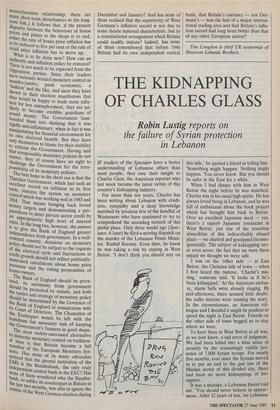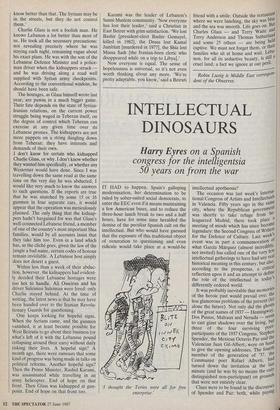THE KIDNAPPING OF CHARLES GLASS
Robin Lustig reports on
the failure of Syrian protection in Lebanon
IF readers of the Spectator have a better understanding of Lebanese affairs than most people, they owe their insight to Charles Glass, the American reporter who last week became the latest victim of this country's kidnapping industry.
For more than ten years, Charles has been writing about Lebanon with erudi- tion, sympathy and a deep knowledge matched by precious few of the handful of Westerners who have continued to try to comprehend the unending turmoil of this pitiful place. Only three weeks ago (Spec- tator, 6 June) he filed a moving dispatch on the murder of the Lebanese Prime Minis- ter, Rashid Karami. Even then, he knew he was taking a risk by staying in West Beirut. 'I don't think you should stay on this side,' he quoted a friend as telling him. `Something might happen. Nothing might happen. You never know. But you should be safer in the East for a while.'
When I had dinner with him in West Beirut the night before he was snatched, Charles was in his usual high spirits. He has always loved being in Lebanon, and he was full of enthusiasm about the book project which has brought him back to Beirut. Over an excellent Japanese meal — yes, there's a superb Japanese restaurant in West Beirut, just one of the countless absurdities of this indescribably absurd place — we chatted and gossipped inconse- quentially. The subject of kidnapping nev- er even arose: the fact that we were there meant we thought we were safe.
I was on the 'other side' — in East Beirut, the Christian side of town — when I first heard the rumour. `Charlie's mis- sing,' someone said. 'It looks as if he's been kidnapped.' At the American embas- sy, alarm bells were already ringing. By mid-afternoon, there seemed little doubt: the radio stations were running the story. In the circumstances, an American col- league and I decided it might be prudent to spend the night in East Beirut. Friends on the other side of town begged us to stay where we were.
To have been in West Beirut at all was, as we now know, a sad error of judgment. We had been lulled into a false sense of security by the reassuringly visible pre- sence of 7,000 Syrian troops. For nearly five months, ever since the Syrians moved in to put an end to the gun law of the Muslim sector of this divided city, there had been no more kidnappings of for- eigners. It was a mistake, a Lebanese friend told me. 'You should never believe in appear- ances. After 12 years of war, we Lebanese know better than that. The Syrians may be in the streets, but they do not control them.'
Charlie Glass is not a foolish man. He knows Lebanon a lot better than most of us. He took all the necessary precautions: not revealing precisely where he was staying each night, remaining vague about his exact plans. He was with the son of the Lebanese Defence Minister and a police- man driver when the kidnappers struck and he was driving along a road well supplied with Syrian army checkpoints. According to the conventional wisdom, he should have been safe.
The hostages, as Glass himself wrote last year, are pawns in a much bigger game. Their fate depends on the state of Syrian- Iranian relations, on the current power struggle being waged in Teheran itself, on the degree of control which Teheran can exercise at any given time over its Lebanese proxies. The kidnappers are not mere puppets on a string dangling down from Teheran: they have interests and demands of their own.
I don't know for certain who kidnapped Charlie Glass, or why. I don't know whether they wanted him specifically, or whether any Westerner would have done. Since I was travelling down the same road at the same time on the very day he was abducted, I would like very much to know the answers to such questions. If the reports are true that he was snatched by some 15 or 16 gunmen in four separate cars, it would appear that the operation was meticulously planned. The only thing that the kidnap- pers hadn't bargained for was that Glass's well-connected Lebanese friend, a member of one of the country's most important Shia families, would by all accounts insist that they take him too. Even in a land which has, as the cliché goes, given the law of the jungle a bad name, certain codes of honour remain inviolable. A Lebanese host simply does not desert a guest.
Within less than a week of their abduc- tion, however, the kidnappers had evident- ly decided their Lebanese hostages were too hot to handle. Ali Osseiran and his driver Suleiman Suleiman were freed: only Charlie stayed behind. At the time of writing, the latest news is that he may have been handed over to the Iranian Revolu- tionary Guards for questioning.
One keeps looking for hopeful signs. When the Syrians came, and the gunmen vanished, it at least became possible for West Beirutis to go about their business (or what's left of it with the Lebanese pound collapsing around their ears) without daily risking their lives. A hopeful sign? A month ago, there were rumours that some kind of progress was being made in talks on political reforms. Another hopeful sign? Then the Prime Minister, Rashid Karami, was assassinated while travelling in an army helicopter. End of hope on that front. Then Glass was kidnapped at gun- point. End of hope on that front too. Karami was the leader of Lebanon's Sunni Muslem community. 'Now everyone has lost their leader,' said a Christian in East Beirut with grim satisfaction. 'We lost Bashir [president-elect Bashir Gemayel, killed in 1982], the Druse lost Kamal Jumblatt [murdered in 1977], the Shia lost Mussa Sadr [the Iranian-born cleric who disappeared while on a trip to Libya]: Now everyone is equal. The sense of hopelessness is universal, so it's not even worth thinking about any more. 'We're pretty adaptable, you know,' said a Beiruti friend with a smile. Outside the restaurant where we were lunching, the sky was blue and the sea was smooth. Life goes cm. But Charles Glass — and Terry Waite and Terry Anderson and Thomas Sutherland and some 25 others — are being held captive. We must not forget them, or then families who sit at home and wait. Leba' non, for all its seductive beauty, is still a cruel land, a fact we ignore at out pad.
Robin Lustig is Middle East eorrespon- dent of the Observer.










































































 Previous page
Previous page